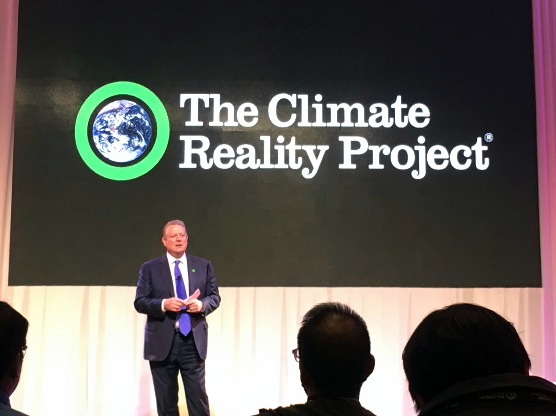The climate reality is, there is hope
For the whole month of March, Health Care Without Harm-Asia hosted two graduate students who participated in various environmental health projects and activities as part of their internship requirements. In this blog, Ronneil Aviles, who is training as physician assistant and doing his Master of Public Health in Touro University in Vallejo, California, shares his insights about the Climate Reality Leadership Corps Training that he attended during his stay in Manila.

Al Gore delivers his world-renowned lecture.
Along with Health Care Without Harm-Asia's Dr. Renzo Guinto (Healthy Energy Initiative Campaigner) and Dianne Mendoza (Communications Campaigner), I attended the Climate Reality Leadership Corps training on March 14 – 16, 2016 at the Sofitel Philippine Plaza Manila. Attended by nearly a thousand participants from the Philippines and abroad, this training is organized by the Climate Reality Project led by Al Gore, former Vice President of the United States, Nobel Peace Prize laureate, and global climate champion.
Before I begin to describe my experience, let me first give you a little background about myself. I first learned of climate change or “global warming” when I was in grade school but did not get fully invested in the cause until Al Gore released his award-winning film “The Inconvenient Truth” in 2006. Like many others who watched his documentary, I was outraged yet highly motivated to increase public understanding of the deleterious effects of greenhouse gases being released into our atmosphere. In college, I started advocating with a group called Environmental Action to raise awareness of the harmful environmental practices going on in the U.S.
However, as time went on and with more battles lost than won, I became disengaged and even demoralized. The media coined this as “green fatigue” or “climate change fatigue” to describe the state as becoming numb to and tired of the constant messages of climate change and its impending doom. I was not alone. Surveys have shown that public concern about environmental issues has decreased in the last 20 years.
However, this all changed when I attended the Climate Reality Leadership Corps Training in Manila, and worked with Health Care Without Harm-Asia on some exciting initiatives around the intersection of climate change, energy, and health.
Over the course of three days, Al Gore and the Climate Reality Leadership Corps presented the dire situation in the Philippines and across the world, the need for relentless advocacy, and hope for renewable energy in the future. In addition, they provided training on how to be an effective leader and persuasive communicator, especially in presenting up to date information on climate change using Al Gore’s classic slide presentation.

Ronneil Aviles (far right) with HCWH-Asia’s Dianne Mendoza and Dr. Renzo Guinto
I will not go into detail on what happened during those three inspiring days, but instead let me tell you my two key takeaways from the training.
There is hope for the future.
We tend to be overwhelmed and bombarded with news of stagnant policies and ever-devastating natural disasters. I am guilty of being accomplice to relaying these pieces of information in a negative fashion, but Climate Reality gave me renewed hope for the future. We were presented with up-to-date information showing that indeed, our reliance on fossil fuels is decreasing, as many current coal fired power plants are being shut down in the U.S., and new coal plant proposals cancelled.
Developing countries such as the Philippines can lead climate action.
It is known that the Philippines is one of the countries most vulnerable to climate change. During the training, I realized that the Philippines, along with many developing countries, can turn this crisis into an opportunity, especially in terms of reducing greenhouse gas emissions. Currently, the country’s consumption of coal increased by 27% between 2012 and 2014, and more coal power plants have been proposed to be built in the future. A common argument made is that the Philippines only emits 0.3% of the world’s greenhouse gases, and the question frequently asked is, why should the Philippines change its energy policy when it contributes so little to global warming?
Interestingly, the answer to that question is another question: “Why not?” The Philippines has 246,000 megawatts of untapped renewable energy capacity. In a short film produced last year by Health Care Without Harm-Asia, it is shown that the Philippines, in fact, is in a unique situation, as it is home to a wide range of cleaner energy alternatives that can be summed up in an acronym – BI.G. S.H.O.W. – which means Biomass, Geothermal, Solar, Hydroelectric, Ocean thermal, and Wind.Overall, with renewable energy technology becoming more efficient and the cost of installation decreasing, the hope for a greener future now is more apparent than it has ever been, including in developing countries like the Philippines.
The need for a new perspective.
Climate Reality Leadership Corps gave me the tools to present Al Gore’s presentation in an impactful way, but there still needs more to be done. My role as a future clinician and my experience in the past 6 weeks with Health Care Without Harm – Asia made me realize that health is a powerful argument for climate action and a sustainable future. Health is a universal value shared by all of humanity, and the health effects of climate change are felt and understood by ordinary people and politicians alike. Health professionals also can make a huge dent in the broader climate discourse, and green hospitals that use solar panels and adopt sustainability principles can set a positive example for other sectors. I believe if we make health a bigger part of the debate, then we can achieve greater progress, perhaps in a much faster rate.
As a second generation Filipino-American, my journey with climate change has really come full circle. From “The Inconvenient Truth” to Climate Reality Leadership Corps Training 10 years later, the timeless message of Al Gore and the clarion call to the global health sector reinvigorated my spirit. Like Al Gore who liked to start and end his presentations with Carl Sagan’s quotes about “the pale blue dot,” let me do the same by quoting Sagan about an important responsibility we all share: “Our responsibility to deal more kindly with one another and to preserve and cherish the pale blue dot, the only home we’ve ever known.”

The pale blue dot – Earth – along with Saturn
- Log in to post comments
